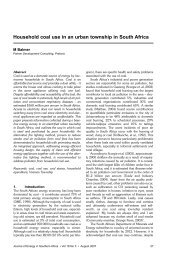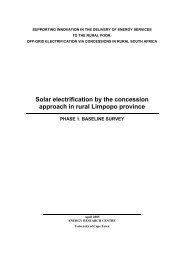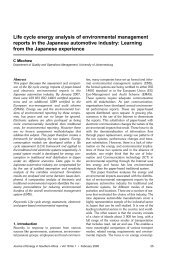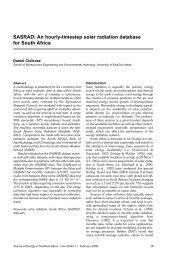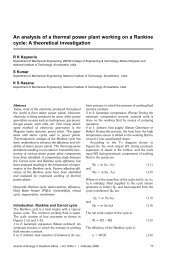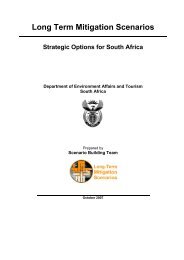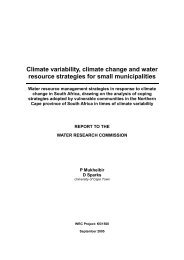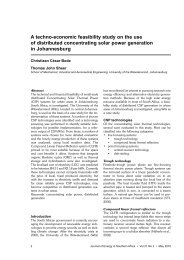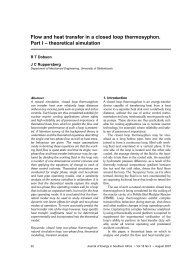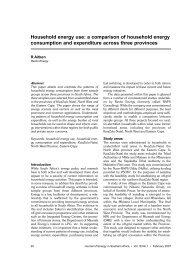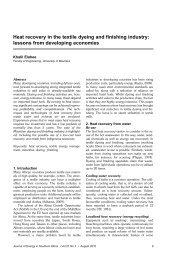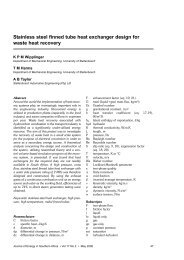(Ed) 2006. Energy policies for sustainable development in South Africa
(Ed) 2006. Energy policies for sustainable development in South Africa
(Ed) 2006. Energy policies for sustainable development in South Africa
You also want an ePaper? Increase the reach of your titles
YUMPU automatically turns print PDFs into web optimized ePapers that Google loves.
20 ENERGY POLICIES FOR SUSTAINABLE DEVELOPMENT IN SOUTH AFRICA<br />
In the residential sector, <strong>for</strong> example, the sav<strong>in</strong>gs to households from greater energy<br />
efficiency can directly contribute to alleviat<strong>in</strong>g energy poverty. Turn<strong>in</strong>g current voluntary<br />
guidel<strong>in</strong>es <strong>for</strong> new hous<strong>in</strong>g <strong>in</strong>to mandatory standards (especially <strong>in</strong> middle- and upper<strong>in</strong>come<br />
hous<strong>in</strong>g) would facilitate this. But even be<strong>for</strong>e this happens, build<strong>in</strong>g codes <strong>in</strong> the<br />
commercial sector, which has greater f<strong>in</strong>ancial capacity, should become mandatory.<br />
Government is tak<strong>in</strong>g the lead <strong>in</strong> some of its own build<strong>in</strong>gs <strong>in</strong> this regard, but more could<br />
be done. Government procurement could impose energy efficiency standards on a wider<br />
range of equipment. Standards <strong>for</strong> a diversity of equipment (such as variable speed drives,<br />
air compression, heat<strong>in</strong>g, ventilation and cool<strong>in</strong>g (HVAC) systems) can help <strong>in</strong>crease<br />
<strong>in</strong>dustrial energy efficiency. Appliance labell<strong>in</strong>g and mandatory energy per<strong>for</strong>mance<br />
standards are other measures that should be considered. All ef<strong>for</strong>ts to improve <strong>in</strong>dustrial<br />
energy efficiency would contribute to economic <strong>development</strong>.<br />
The transport sector is a large sector of energy consumption at municipal level, with large<br />
emissions of both local and global pollutants. Improved fuel efficiency standards would<br />
<strong>in</strong>crease the energy efficiency of the national fleet. Vehicle emissions standards are<br />
currently be<strong>in</strong>g considered by the Department of Environmental Affairs and Tourism.<br />
Implement<strong>in</strong>g efficiency measures requires <strong>in</strong>stitutional support. The <strong>in</strong>stitutional<br />
framework needs to be strengthened, both with<strong>in</strong> and outside government. A national<br />
agency champion<strong>in</strong>g energy efficiency would consolidate ef<strong>for</strong>ts, possibly work<strong>in</strong>g <strong>in</strong><br />
collaboration with energy service companies. Research, <strong>development</strong> and demonstration<br />
would be of particular importance.<br />
2.4.3 Renewable energy<br />
At present, the commercial exploitation of <strong>South</strong> <strong>Africa</strong>’s renewable energy sources is<br />
limited, but it is clear that the cost of renewable energy will cont<strong>in</strong>ue to decl<strong>in</strong>e as the<br />
technologies mature. Increased use of renewables will require the <strong>in</strong>troduction of new<br />
<strong>policies</strong>. The White Paper on Renewable <strong>Energy</strong> (2003) set a target of 4% of projected<br />
electricity demand <strong>for</strong> 2013 (DME 2003b). A strategy <strong>for</strong> implement<strong>in</strong>g this target needs to<br />
be <strong>for</strong>mulated, focuss<strong>in</strong>g on specific projects and their f<strong>in</strong>anc<strong>in</strong>g.<br />
The government has often stated its <strong>in</strong>tention to improve the local content of renewable<br />
energy technologies used <strong>in</strong> <strong>South</strong> <strong>Africa</strong>. Hence a policy should be set up <strong>for</strong> progressively<br />
<strong>in</strong>creas<strong>in</strong>g local content <strong>in</strong> the local manufacture of renewable technologies. Such a policy<br />
should be accompanied by government-sponsored enabl<strong>in</strong>g conditions <strong>for</strong> local technology<br />
<strong>development</strong>.<br />
Strengthen<strong>in</strong>g the regulatory framework <strong>for</strong> promotion of these technologies with<strong>in</strong> the<br />
NER will help their <strong>development</strong>. F<strong>in</strong>ancial support <strong>for</strong> renewables <strong>in</strong> the <strong>for</strong>m of subsidies<br />
and tax <strong>in</strong>centives should be considered, targeted <strong>for</strong> a limited period. Initially, it appears<br />
that the national Treasury will set aside funds on a once-off basis, but <strong>in</strong> the longer term,<br />
f<strong>in</strong>anc<strong>in</strong>g schemes will have to be considered. They could <strong>in</strong>clude:<br />
• feed-<strong>in</strong> tariff mechanisms;<br />
• portfolio quotas with or without tradable certificates;<br />
• tax <strong>in</strong>centives;<br />
• green pric<strong>in</strong>g.<br />
In late 2005, the Renewable <strong>Energy</strong> F<strong>in</strong>ance and Subsidy Office was established. The<br />
Office’s mandate <strong>in</strong>cludes the management of renewable energy subsidies and provision of<br />
advice to developers and other stakeholders on renewable energy f<strong>in</strong>ance and subsidies,<br />
<strong>in</strong>clud<strong>in</strong>g size of awards, eligibility, and procedural requirements (www.dme.gov.za/dme/<br />
energy/refso.htm).



